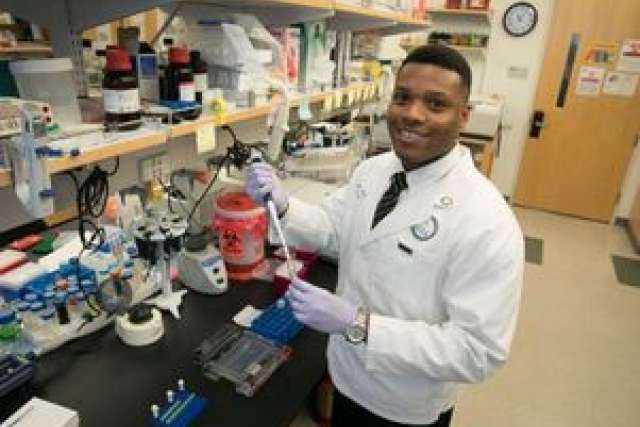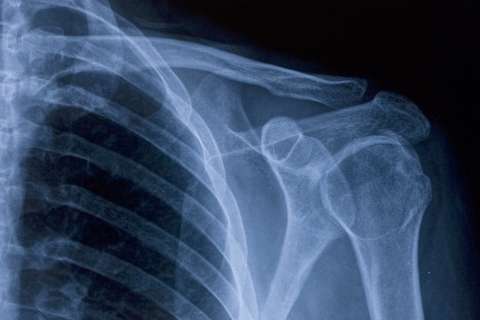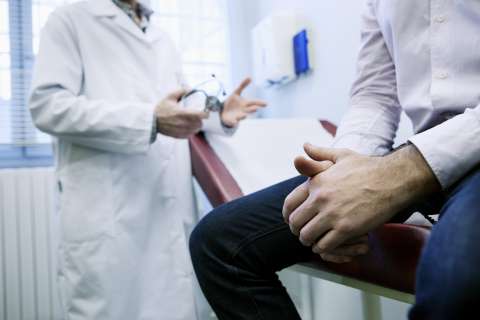For some medical students, changing the world can't wait until after graduation. That's the case for Richard Morgan and Edgar Corona, students at UCLA's David Geffen School of Medicine who started working on this mission even before adding M.D. to their names.
A fourth-year medical student, Morgan is conducting research to develop a new gene therapy vector for the treatment of sickle cell disease. This approach uses a patient’s own blood-producing stem cells to create a lifelong supply of healthy red blood cells. “My goal is to be a world-class hematologist, capable of transforming the health of patients afflicted with devastating blood disorders,” Morgan said.
He’s not stopping there. Morgan is also committed to fighting health care disparities in underserved communities, where chronic conditions such as sickle cell disease take a disproportionate toll.
“Patients in underserved communities diagnosed with chronic illness often experience obstacles in obtaining treatment, adding to their suffering,” said Morgan. To reduce these disparities, he has helped organize health fairs in Central Los Angeles and Watts through programs at Charles R. Drew University of Medicine and Science. He has also served as a student mentor to minority high school students.
“Mentorship is important because we need more physicians who understand issues that people from underserved communities face when obtaining care,” he said.
Edgar Corona, a third-year medical student in the UCLA/PRIME dual-degree program, shares Morgan’s passion for working with underserved communities. “All patients deserve to be treated with kindness and respect — that’s why I’m committed to a career in addressing health care disparities by implementing evidence-based programs and practices,” he said.
Corona is already making strong headway in that direction. As a UCLA undergraduate working with the Latino Student Health Project, he and his four student co-directors organized trips for UCLA resident physicians to provide medical care to medically underserved communities in Mexico. As a medical student working with the UCLA Blum Center on Poverty and Health in Latin America, Corona conducted population-based research in Morelos, Mexico, on the effectiveness of a cervical cancer prevention program. What’s more, as vice president of community affairs for the Latino Medical Student Association's west regional group, he wrote a proposal that resulted in a five-year, $300,000 grant from AltaMed, funds that will be used for scholarships and leadership training.
Morgan's and Corona’s efforts to make the world a better place have not gone unnoticed.
Morgan was awarded the National Medical Fellowship’s Franklin C. McLean Award in recognition of his outstanding academic achievement, leadership and community service. Corona received the Herbert W. Nickens Medical Student Scholarship from the Association of American Medical Colleges for demonstrating leadership in his efforts to eliminate inequities in both medical education and health care in minority communities.
Having both grown up in urban areas, Morgan and Corona experienced the very inequities they’re now fighting against. In fact, both were inspired to pursue medicine after seeing the difficulties their mothers faced when they tried to obtain quality health care.
Morgan’s mother battled diabetes with little access to free or affordable health care. Morgan was moved by the many devoted physicians who were willing to help her. “Their compassion and their conviction that health care is a universal right inspired me to pursue this career path,” he said.
Similarly, Corona watched his mother struggle after she broke her foot and tried to navigate the public health care system, encountering long commutes and wait times, and a scarcity of doctors who understood Spanish. “Ironically, my mother’s difficulties became a catalyst for me to pursue a career in health care to improve the health systems that serve vulnerable communities,” he said.
Morgan and Corona are also grateful for their mentors. Morgan met his mentor, Dr. Donald Kohn, through the UCLA Medical Scientist Training Program. “Dr. Kohn is a world-class expert in developing gene therapy strategies for the treatment of monogenic disorders of the bone marrow,” said Morgan. “I’m honored to work with him.”
Corona’s mentor, Dr. Efrain Talamantes, inspired him to co-found Alliance in Mentorship, a nonprofit organization dedicated to providing innovative mentorship opportunities to aspiring health professionals. “When Dr. Talamantes reached out to me about working alongside him with this idea, he and I just took off with it,” said Corona. “And today my involvement in developing the organization is the work I’m most proud of. The alliance has generated Mimentor.org, a great online resource for students looking for mentorship as they pursue a career in health care.”
The dedication, passion and hard work of Morgan and Corona exemplify the commitment that students at the David Geffen School of Medicine at UCLA have to the larger community.
“I’m so grateful for the McLean Award, and I hope that in the future, I will impress the medical community in a significant way,” said Morgan.
“The Nickens Scholarship shows that medical schools care about decreasing health and education inequities, and it serves as another reminder that the work that I and students like me are doing is important,” said Corona.



